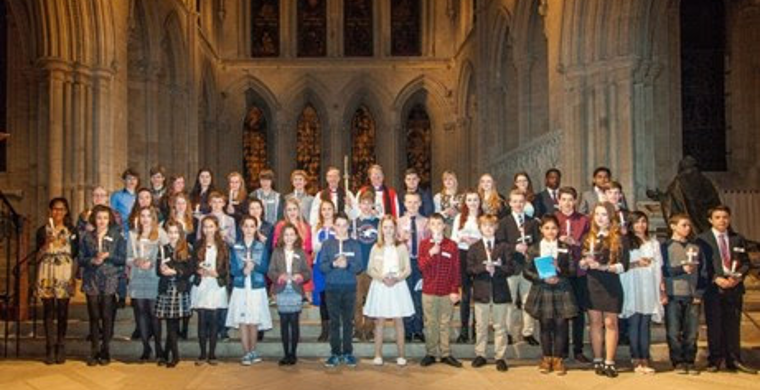Reports of Anglican decline 'have been greatly exaggerated'
By Madeleine Davies
THE CHURCH TIMES
www.churchtimes.co.uk/a
June 12, 2015
Thinking of oneself as "Church of England" or "Anglican" is increasingly irrelevant, clergy have suggested, responding to last week's statistical analysis indicating that Anglicans were in steep decline in the UK (News, 5 June).
The Dean of Chelmsford, the Very Revd Nicholas Henshall, writes (Letters) that parish priests and deans are leading "increasingly post-denominational" communities.
He points to the decline in confirmations, even in churches that are growing, as "a version of the same story. . .
"Confirmation suggests an ownership of a specific denominational identity, which is simply not part of the deal for most people. I would suggest that even most people of my generation, and certainly those of my children's, find denominational identity increasingly irrelevant."
His position was affirmed by Ali Campbell, a youth-and-children's-ministry consultant.
"Young people in the Church of England are not growing up Anglican," he said on Wednesday. "They may 'join' at some point when confirmed, and move on to parish rolls; but, in my experience of the last 18 years serving at both local and diocesan level, . . . they would first and foremost identify with Christ and their local church - not because their local church is Anglican, but because it is where they have been accepted, loved, received guidance, and found significance. . . Denominational stuff just is not on their radar."
Mr Campbell pointed to the rise in non-denominational gatherings, such as Spring Harvest and Soul Survivor, and the "cross-fertilisation" present in C of E schools: "We pass on what we value and what we consider to be of most importance," he said.
"It may have been in the past that what we passed on was the key tenets of Anglicanism such as the Thirty-Nine Articles. If, however, we have shifted our focus to put Jesus more at the centre, the gospel we proclaim, the kingdom we are in with Christ as the head, it is hard to make that 'Anglican', because these things we are teaching are about being part of the Universal Church. . .
"We may not see young people joining the Anglican Church, but they are joining in with the mission of God as the local Anglican churches crack on and make a local difference."
The publication of the NatCen analysis of the British Social Attitudes (BSA) survey prompted comparison with other polls that have asked the same question: "Do you regard yourself as belonging to any particular religion?"
The last census suggested that 59 per cent of the population identified as Christian and 31 per cent as Church of England/Anglican/Episcopal. The YouGov poll conducted for the Faith Debates in 2013 suggested that just under one third identified as Anglican or C of E. The BSA figure was 17 per cent.
The Rector of Plemstall and Guilden Sutton, the Revd Dr Mark Hart, suggested that this might reflect "the fuzziness of many people's sense of denominational identity."
Another parish priest, the Rector of St Andrew's, Farnham, the Revd Simon Reynolds, estimated that at least 20 per cent of his Sunday congregation was made up of "Methodists or URCs who have drifted towards us over the past decade".
Linda Woodhead, Professor of Sociology at Lancaster University, suggested that the BSA figures "should be treated with some caution". But, she said: "Where all the polling agrees is in finding that Anglican affiliation has declined dramatically since the 1980s, and continues to do so."
The Bishop of Willesden, the Rt Revd Pete Broadbent, said that the figures reflected "several different things. . . There's post-Christendom: people who've grown up without religion in their lives no longer feeling the need to identify as nominal C of E.
"There's post denominational: those who just call themselves Christians and don't like the labels. And there's the move away from orthodox faith to implicit and understated quasi-spirituality.
"I'm not worried about whether people call themselves Anglicans. What's important is bringing people into encounter with the living God, enabling them to become disciples of Jesus Christ and aligned with the work of the Spirit in the world. We need to re-evangelise England."














